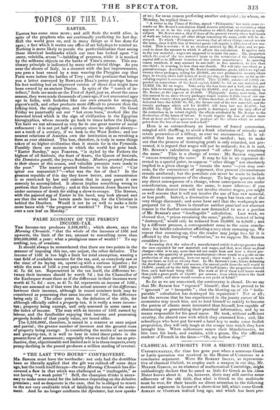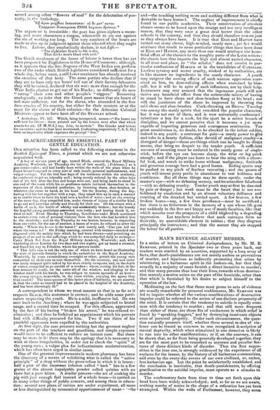CLASSICAL AUTHORITY FOR A SHORT-TIME BILL.
UNFORTUNATELY, the time has gone past when a sonorous Greek or Latin quotation was received in the House of Commons as a conclusive argument. Were Sir ROBERT INGLIS, as representa- tive of classical Oxford, to employ such a weapon in our day, Mr. MILNER GIBSON, as an alumnus of mathematical Cambridge, might unblushingly declare that he cared as little for Greek as his Alma Mater knows about it. As, however, there may still survive some adherents of the old faith, that what is Greek to the multitude must be true, for their benefit we direct attention to the following metrical argument in favour of a short-time bill, which some Greek ASHLEY or GASTLER indited long ago, and which has been pre-.
served among other "flowers of soul" for the delectation of pos- terity, in the Anthology.
'EE Zipat ktoxecur Iteavorrarat• af 8e per* auras realapacrt aeocetaLepat ZHAI Acyovat gporms.
The argument is irresistible : the poet has given ciphers a mean- ing, and mute characters a tongue, wherewith to cry out against the sin of working too long. The very numbers of the hours are made to rise up in judgment against those who toil when they ought to live. Labour, they emphatically declare, is not Life— "The nightmare Death-in-life is she,
That thieks man's blood with cold."
The Greek maxitnum of the hours of labour is lower than has yet been proposed for Englishmen in the House of Commons ; although, as it appears that the free Negroes of the West Indies can perform two of the tasks which British legislators considered sufficient for a whole day, before noon, a still lower maximum has already received the sanction of that body. The same parties who declare that if they are to have only ten hours' toil out of their factory-labourers they will be ruined, declared that six wera more than enough for the West India planter to get out of his Blacks ; so differently do men " larrup " their own and other people's "niggers." Reasoning analogically, we infer that the Greek poet meant that six hours of toil were sufficient, not for the slaves, who abounded in the free democracies of his country, but either for their masters or at the most for the slaves of their colonies—for the Athenian Colonial Mieisters appear to have been all of the STANLEY school.
* Anthology, IV. 167. Which, being interpreted, means—" Six hours are sufficient for labour : those pointed out by the letters next after that which stands for six, (2, H,e,I,) say, Live, to mortals." The Greeks used letters -for numerals; and the four here mentioned, (indicating respectively 7, 8, 9, 10,) form an imperative which expresses the precept "live."



























 Previous page
Previous page